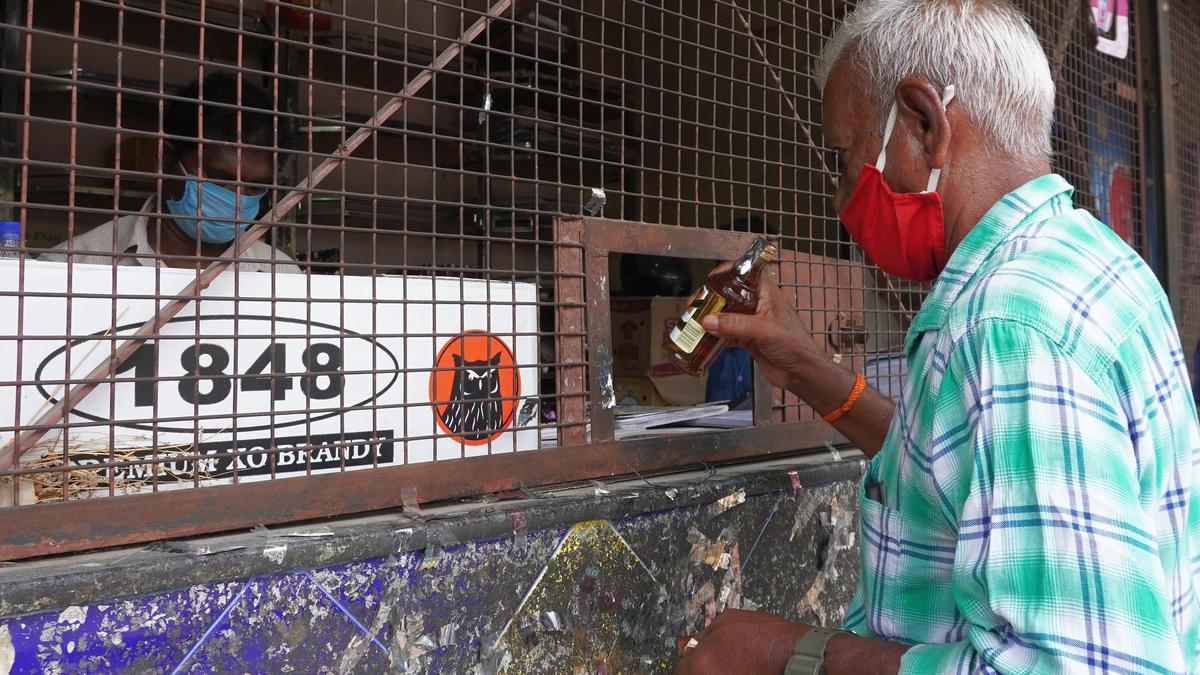The petitioner said Tasmac misuses its monopoly in the business and sells only select brands of liquor much to the chagrin of the consumers. Representational file image.
| Photo Credit: R. Ashok
The Madras High Court is slated to hear on July 22 a public interest litigation (PIL) petition which has insisted on ending the monopoly of Tamil Nadu State Marketing Corporation (Tasmac) over wholesale and retail sale of liquor and instead permit the sale through supermarkets and ration shops.
The petition has been listed for admission before the first Division Bench of Acting Chief Justice D. Krishnakumar and Justice K. Kumaresh Babu. S. Muralidharan, an IT firm employee from Chennai, had filed the case claiming that rampant corruption in Tasmac was the reason for several ills related to liquor.
The petitioner wondered how Tasmac could report to have suffered losses year after year despite recording turnover of over ₹40,000 crore during the same period. He relied upon data received through the Right to Information (RTI) Act to substantiate his claim of the corporation having reported losses.
He said, the turnover of Tasmac was ₹39,760.78 crore in 2020-21 and ₹42,421.34 crore in 2021-22 but it had reported loss of ₹161.45 crore and ₹69.92 crore respectively after paying taxes. “It means profits are diverted elsewhere/under the table to reach a few politicians,” he claimed.
Alleging that most of the breweries as well as distilleries which supply liquor to Tasmac were owned by politicians belonging to the ruling as well as opposition parties, the petitioner said, Tasmac misuses its monopoly in the business and sells only select brands of liquor much to the chagrin of the consumers.
Stating that availability of good quality liquor and a best night life for the executives to unwind in the evenings was essential to boost tourism and attract industries, the petitioner said, Tamil Nadu was losing out on both these fronts because of the corrupt practices prevalent in Tasmac.
He said, the reduction in footfall in Chennai airport and increase in footfall in Bengaluru and Hyderabad airports were an indication of the State slowly waning out of the travel map. “People who have tasted liquor in other States have testified that the quality is much better over there,” he claimed.
The petitioner also alleged that the personnel manning the Tasmac retail outlets charge ₹10 over and above the Maximum Retail Price (MRP) for 180ml liquor bottles, ₹20 more for bottles with larger quantities and ₹50 to ₹200 more for imported and expensive liquor bottles depending upon their MRP.
Stating that this overcharging itself leads to collection of hundreds of crores of rupees annually, the petitioner said: “Which, according to reliable sources, is shared from the counter salesman to the top most executive in the organisation [Tasmac] and the Minister in charge.”
The petitioner insisted on issuing an interim direction to Tasmac to place notice boards of 4X4 feet outside every retail liquor shop clearly stating in English as well as Tamil that the consumers need not pay anything more than the MRP to purchase the liquor bottles.
Further, insisting on lifting the ban imposed on toddy since 1986; the petitioner said, it could now be permitted to be sold with certain restrictions. In so far as Indian Made Foreign Liquor was concerned, it could be sourced from across the country and sold through supermarkets and ration shops, he added.
Ultimately, the petitioner wanted the court to declare as unconstitutional a 1986 amendment made to the Tamil Nadu Prohibition Act for banning toddy and also a 2003 amendment through which Tamil Nadu State Marketing Corporation (Tasmac) was given the sole rights for wholesale as well as retail sale of liquor.
Until the disposal of his main plea, he sought yet another interim direction to the State government to conduct an inquiry regarding the allegations levelled by him against Tasmac and table the report before the court.






